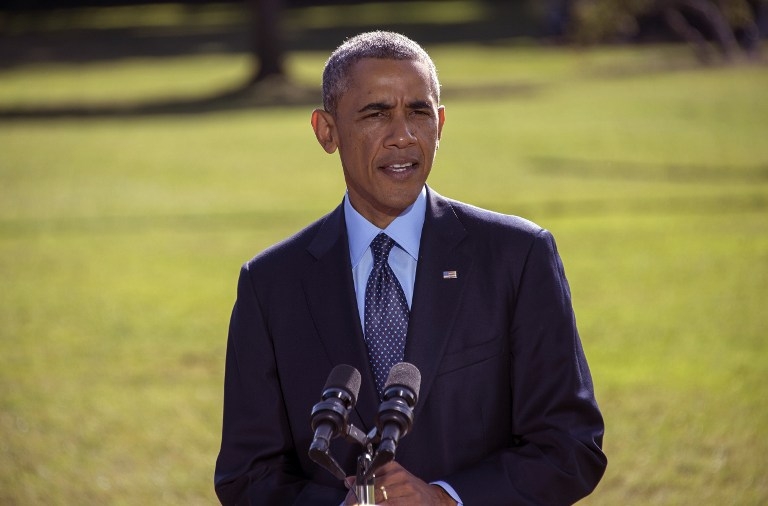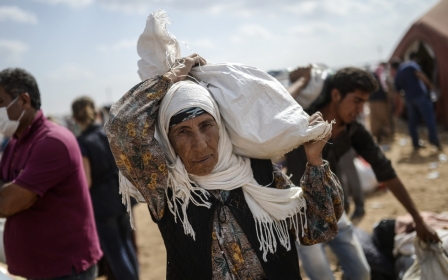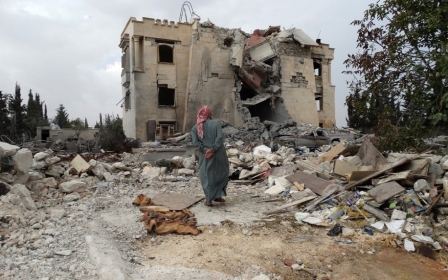Could US president actually be talking 'peace'?

Senior officials in Syrian President, Bashar al-Assad’s administration are trying to work out the meaning of two key passages in President Barack Obama’s speech to the United Nations last week. Neither figured prominently in Arab or Western reporting, but they appeared to suggest new ways of ending Syria’s wars by political rather than military means.
After condemning strife between Sunnis and Shiites around the region, which he bluntly described as “this madness,” the US president said “it’s time for a broader negotiation in which major powers address their differences directly, honestly, and peacefully across the table from one another, rather than through gun-wielding proxies.” He raised the concept of a truce, saying, “nowhere is this more necessary than Syria.”
Yet these peace-making ideas run counter to other passages in the same speech which sought to justify international military action against IS and the further arming of Syrian opposition groups. They are proxies of foreign governments par excellence. So the Obama speech was contradictory and confusing.
Assad’s officials told me in Damascus last week that they welcome the US airstrikes. If the US struck IS in Iraq but not in Syria, this would bring more IS fighters into Syria and cause greater problems, they argued. Syrian Foreign Minister, Walid Moallem had said in advance of the strikes that any US military action that was not coordinated with Damascus would be treated as illegal and an act of aggression. Syrian officials say their government’s condition has been met and US officials are informing them through a third party of the details of each set of attacks. They have also given assurances that coalition aircraft will not strike Syrian forces or state institutions.
While all this is good news for Assad - as it dramatically reduces his international isolation and weakens IS - officials remain concerned about the drift of US policy. “We don’t know if it will be followed by other steps,” said one senior source, suggesting that Obama might switch targets at a later stage and attack the Syrian government once IS is weakened. Many of the Gulf states in the military coalition have made it clear they want that.
That is why Assad’s officials are looking carefully at the two contrasting proposals in the Obama speech. His reference to a conference of regional players and major powers is raising their hopes that US strategy will change in the opposite direction from what the Gulf states want. Washington will move towards resuming direct contact with Damascus. “They can’t change suddenly and quickly, but I feel they’re going to change,” said the senior source. “A conference of all regional powers which included Syria would be good.”
Damascus is pleased by the cautious resumption of contacts between Iran and Saudi Arabia. Syrian officials see this rapprochement as an important development that can reduce tension on the Shiite/Sunni front. They are intrigued by the rising tension between Egypt and Turkey, and Turkish President Erdogan’s ostentatious walking-out of the UN General Assembly during Egyptian President al-Sisi’s speech. They are talking up Egypt’s role in the region in the hope that Sisi will start to argue their case as a fellow secular state threatened by Islamists and jihadis. They trust he will make this point, not just to other Arab leaders, but to Washington as well, though they recognise that Egypt is financially dependent on Saudi and Gulf loans and cannot easily defy his paymasters or speak publicly for Assad.
The biggest puzzle is the truce reference in Obama’s UN speech. However, Syria officials choose to react, it was in many ways the most constructive element in the speech if the US president meant he supports a ceasefire in Syria. He could hardly mean a truce with IS, so the assumption has to be that he meant a truce between the Assad regime and the armed opposition. The case for a truce has been argued in detail by Yezid Sayigh of the Carnegie Middle East Centre.
A call for a common front of the Syrian army and the armed non-IS opposition has been made by Julien Barnes-Dacey and Daniel Levy of the European Council for Foreign Relations.
How could a Syrian truce emerge? Local truces or ceasefires have been organised in several areas of Syria, like Homs and the Damascus suburbs of Muadamiyeh and Barzeh. The government calls them “reconciliation agreements,” but critics have seen them as surrender pacts linked to the lifting of a government siege on an area so that food can be delivered to civilians while fighters are disarmed or allowed to leave. Their one-sidedness has tended to discredit them as models to follow. Activists say a truly durable ceasefire has to involve mutual concessions and a political perspective in which the grievances that led to the original uprising can be met, in full or in part.
A ceasefire that is aimed at creating a common front against a third party, in this case, IS and al-Nusra, would have greater credibility than one that was reached just to enable a siege to end.
It would amount to a deeper acceptance of the other side’s interests and legitimacy.
The place to start might well be Aleppo. Syria’s second city is likely to be IS’s next target, if the militant jihadis realise their current priority of destroying Kurdish resistance in the towns and villages that separate Raqqa from Aleppo. Now is the time to start discussions on a ceasefire in Aleppo that would allow both the government and the rebels in the city to re-focus and defend the city’s approaches. If Obama backed the notion, we would find out if his ‘‘truce” proposal really has teeth.
- Jonathan Steele is a veteran foreign correspondent and author of widely acclaimed studies of international relations.
The views expressed in this article belong to the author and do not necessarily reflect the editorial policy of Middle East Eye.
Photo Credit: US President Barack Obama makes a statement on the first US bombing of the Islamic State group(IS) and Al-Qaeda at the White House in Washington, DC 23 September 2014 (AFP).
New MEE newsletter: Jerusalem Dispatch
Sign up to get the latest insights and analysis on Israel-Palestine, alongside Turkey Unpacked and other MEE newsletters
Middle East Eye delivers independent and unrivalled coverage and analysis of the Middle East, North Africa and beyond. To learn more about republishing this content and the associated fees, please fill out this form. More about MEE can be found here.





